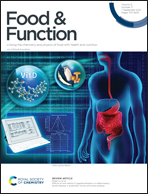Gastrodin extends the lifespan and protects against neurodegeneration in the Drosophila PINK1 model of Parkinson's disease
Abstract
Gastrodin is the main bioactive ingredient of a famous Chinese herb Rhizoma Gastrodiae. Many studies have reported that gastrodin has antioxidative and neuroprotective effects, although its effect on longevity and the mechanism of neuroprotection have not been well studied. Here, we use Drosophila melanogaster as a model to investigate the longevity and neuroprotective effects of gastrodin. Gastrodin significantly extended the lifespan, increased the climbing ability, enhanced the resistance to oxidative stress, increased the enzyme activities of superoxide dismutase (SOD) and catalase (CAT), and promoted the expression of anti-oxidative genes in old flies. The food intake, reproduction and starvation resistance were not affected in flies treated with gastrodin. Moreover, gastrodin delayed the onset of Parkinson-like phenotypes in Pink1B9 mutant flies, including the prolongation of the lifespan, rescue of the climbing ability, rescue of the progressive loss of a cluster of dopaminergic neurons in the protocerebral posterial lateral 1 region, and increase of the dopamine content in the brain. Gastrodin did not ameliorate the tau-induced neurobehavioral deficits in the fly AD model of taupathy. Together, these results indicate that gastrodin could prolong the lifespan by regulating the antioxidant ability, and protect against neurodegeneration in the Pink1B9 model of PD. This suggests that gastrodin can be considered as an ideal therapeutic candidate for drug development towards anti-aging.



 Please wait while we load your content...
Please wait while we load your content...